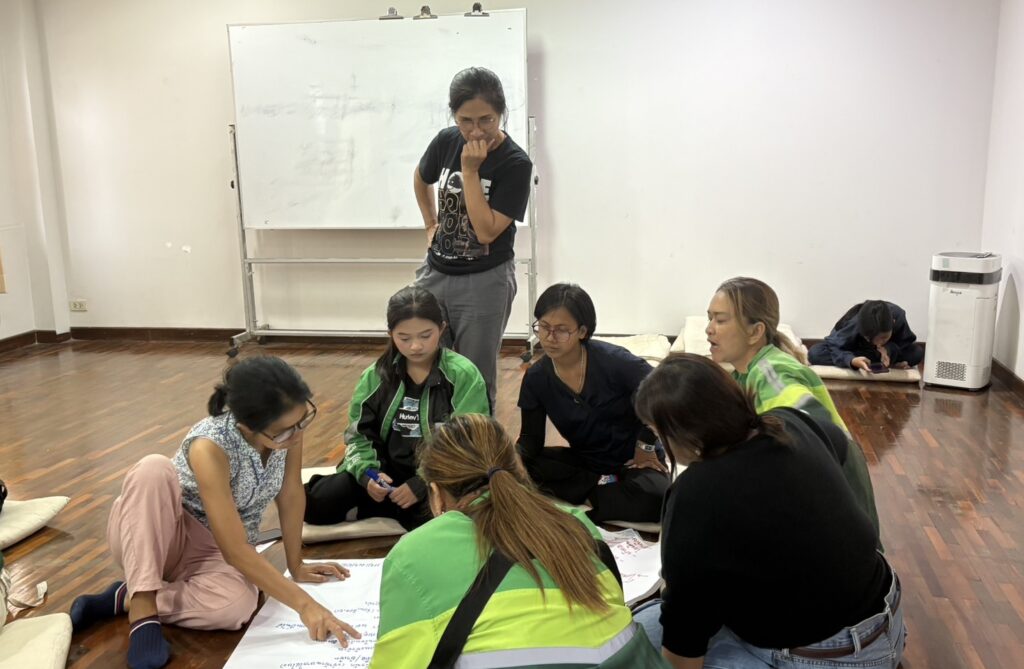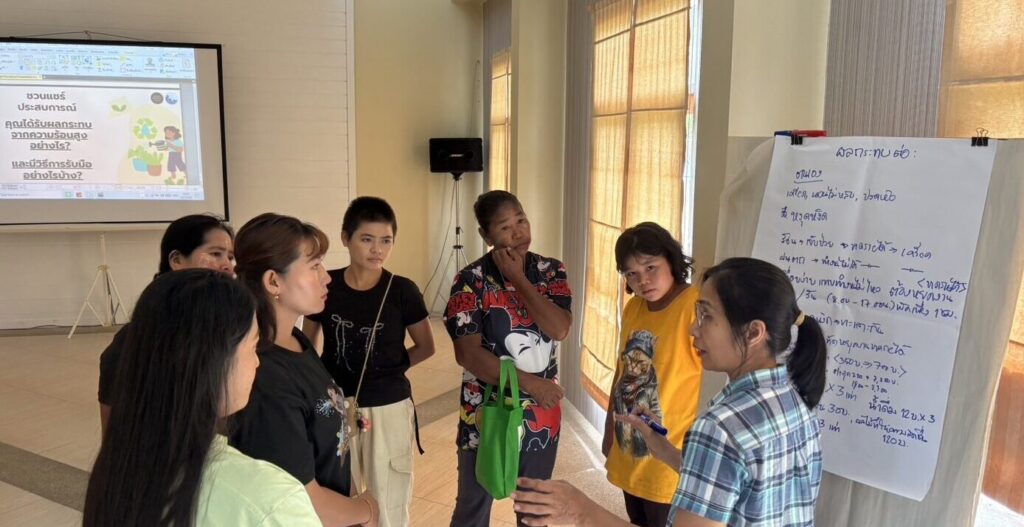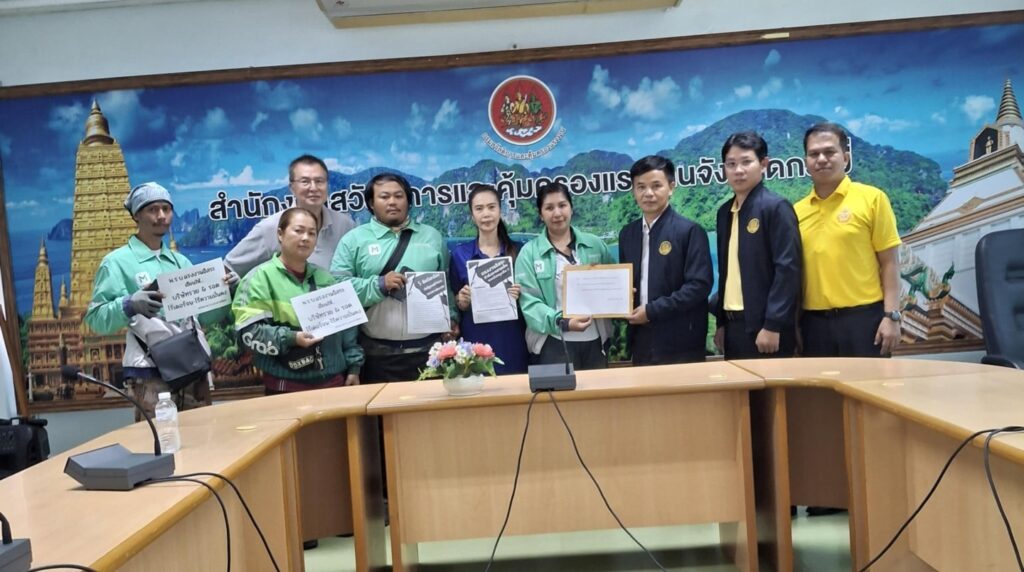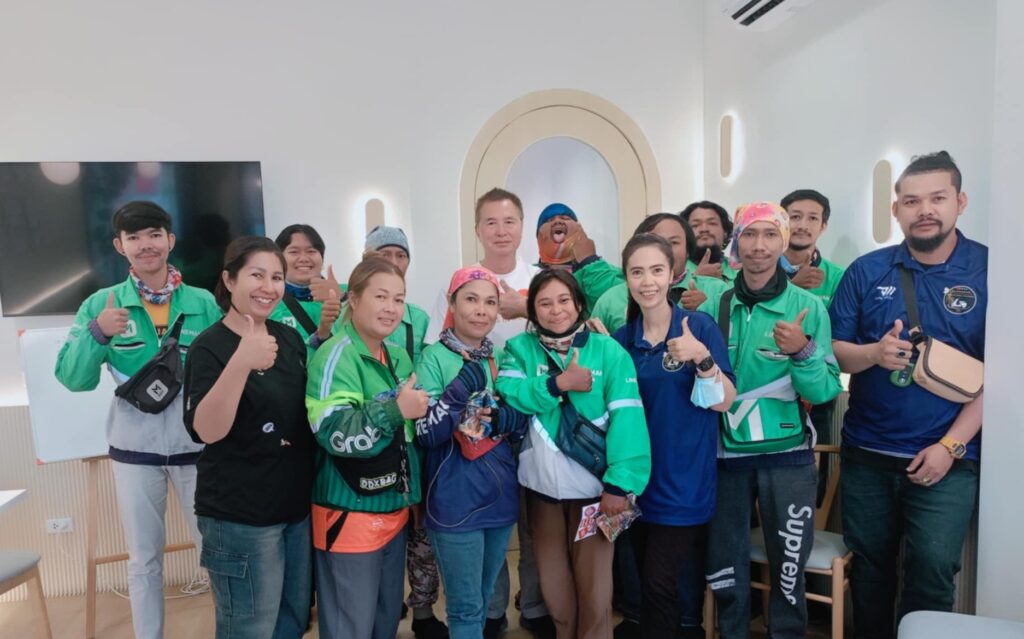(See English version below.)
เดือนกรกฎาคมที่ผ่านมา เราเขียนจดหมายข่าวฉบับนี้ท่ามกลางสถานการณ์ตึงเครียดทางการเมืองระหว่างไทยและกัมพูชา ซึ่งส่งผลกระทบต่อความปลอดภัย การดำรงชีวิต และการทำงานของผู้คนในพื้นที่แนวชายแดนที่ต้องเผชิญกับความไม่แน่นอนอย่างหลีกเลี่ยงไม่ได้ แม้เหตุการณ์จะยังไม่ถึงที่สิ้นสุด เราหวังว่าทุกภาคส่วนจะร่วมกันหาทางออกอย่างรอบคอบ โดยให้ความปลอดภัยของประชาชนเป็นสิ่งสำคัญ
สถาบันแรงงานและเศรษฐกิจที่เป็นธรรมยังคงดำเนินกิจกรรมต่อเนื่องทั้งการรณรงค์ร่วมกับไรเดอร์และแรงงานแพลตฟอร์มในประเด็นร่างพระราชบัญญัติส่งเสริมและคุ้มครองแรงงานอิสระ และการประชุมกลุ่มย่อยร่วมกับคนงานหญิงจากภาคส่วนต่างๆ เกี่ยวกับผลกระทบที่ได้รับจากความร้อนสูงที่มีต่อสุขภาพ การทำงาน และสภาพความเป็นอยู่
จากบทสนทนาและการลงพื้นที่ในช่วงเดือนที่ผ่านมา เราได้เห็นทั้งความพยายามของแรงงานในการปรับตัว และเสียงสะท้อนที่ต้องการการรับฟังจากหน่วยงานและผู้ที่เกี่ยวข้อง เราจึงขอส่งต่อประเด็นและเสียงเหล่านี้ให้กับผู้อ่านเพื่อเป็นแรงสนับสนุนให้การคุ้มครองแรงงานในปัจจุบันและอนาคตสามารถตอบสนองต่อความเป็นจริงที่คนทำงานได้อย่างแท้จริง
งานของเรา
สนทนากลุ่มแรงงานหญิง: ความร้อนสูง ผลกระทบ และการรับมือ


ต่อเนื่องจากความร่วมมือกันระหว่างสถาบันแรงงานและเศรษฐกิจที่เป็นธรรม (JELI) และองค์กร Climate Resilience for All ในการสำรวจกลุ่มคนงานหญิงที่ประกอบอาชีพซึ่งได้รับผลกระทบโดยตรงจากการเปลี่ยนแปลงของสภาพอากาศและความร้อนสูงในพื้นที่กรุงเทพมหานครและสมุทรสงคราม โดยการจัดการประชุมกลุ่มย่อยเพื่อเก็บข้อมูลเชิงลึกถึงสภาพการทำงาน ผลกระทบที่ได้รับ และแนวทางการรับมือของคนงาน ในเดือนกรกฎาคมที่ผ่านมา เราได้ขยายกลุ่มจากไรเดอร์และคนงานผ่าหอย ไปยังแรงงานในภาคก่อสร้างซึ่งเป็นอีกกลุ่มที่ได้รับผลกระทบจากความร้อนโดยตรงและรุนแรง
คนงานในแคมป์ก่อสร้างต้องทำงานอยู่กลางแดดและอากาศที่ร้อนจัดอย่างหลีกเลี่ยงไม่ได้ ไม่สามารถปรับเปลี่ยนเวลาทำงานเป็นช่วงกลางคืนเหมือนอย่างไรเดอร์หรือคนงานผ่าหอย เพราะมีการเข้าและออกงานเป็นเวลา รวมถึงเงื่อนไขทางทัศนวิสัย การป้องกันและรับมือก็ทำได้ยาก เครื่องแต่งกายต้องสวมแบบมิดชิดปกปิดเพื่อป้องกันแสงแดด ในขณะเดียวกันก็ทำให้เกิดความไม่สบาย อึดอัด ส่งผลต่อสุขภาพ บางคนมีอาการใจสั่น หน้ามืด ปวดหัว แต่ไม่สามารถหยุดงานได้ เพราะหากหยุดงานก็เท่ากับต้องสูญเสียรายได้ไปในวันนั้น ทั้งนี้ ในการพูดคุยก็ได้มีการเสนอแนะแนวทางการป้องกันที่คาดว่าจะเป็นประโยชน์ เช่น แคมป์ที่พักของคนงานที่มักสร้างง่ายๆ ด้วยสังกะสี ทำให้เมื่อแดดแรงและอากาศร้อนจัดก็จะเก็บความร้อนมาก เป็นสิ่งที่นายจ้างพึงคำนึงถึงและปรับปรุงเพื่อความปลอดภัยและสวัสดิการที่เหมาะสมของคนงาน การมีที่พักแดด การเตรียมน้ำดื่มสะอาด และตระหนักถึงความเสี่ยงในการทำงานของคนงานต้องคำนึงถึงสภาพอากาศที่ร้อนจัดเป็นสิ่งที่นายจ้างต้องพิจารณา และภาครัฐควรรับทราบถึงสภาพการทำงานที่หลากหลายซึ่งหลายกลุ่มยังไม่ได้รับความสนใจหรือการคุ้มครองอย่างเหมาะสม
ในเดือนสิงหาคม สถาบันแรงงานฯ จะยังคงจัดการประชุมกลุ่มย่อยต่อไปเพื่อเก็บบันทึกข้อมูล ประสบการณ์ และข้อเสนอแนะจากคนงาน เพื่อรวบรวมเป็นข้อเสนอแนะเชิงนโยบายต่อหน่วยงานที่เกี่ยวข้องต่อไปในการดำเนินนโยบายเพื่อรับมือกับปัญหาสภาพอากาศที่ส่งผลกระทบต่อมนุษย์ ซึ่งเป็นปัญหาที่ต้องเร่งแก้ไขในระดับรัฐ
#พรบผ่านปั๊บรายรับลดปุ๊บ : การเคลื่อนไหวของไรเดอร์ต่อร่าง พ.ร.บ. ส่งเสริมและคุ้มครองแรงงานอิสระ


ในเดือนกรกฎาคมที่ผ่านมา ไรเดอร์กลุ่มต่างๆ ทั้งจากพื้นที่กรุงเทพมหานครและต่างจังหวัด ได้พบปะและหารือกันผ่านช่องทางต่างๆ เพื่อทำความเข้าใจ แลกเปลี่ยน และวางแผนการเคลื่อนไหวเพื่อให้เกิดการรับรู้ในประเด็นร่างพระราชบัญญัติส่งเสริมและคุ้มครองแรงงานอิสระ ซึ่งกระทรวงแรงงานกำลังผลักดันให้เกิดขึ้นท่ามกลางเสียงคัดค้านและข้อกังขาของแรงงานผู้มีส่วนได้ส่วนเสีย ตาม พ.ร.บ. ฉบับนี้ ไรเดอร์จะถูกจำแนกเป็น “แรงงานกึ่งอิสระ” ทำให้ขาดจากความสัมพันธ์การจ้างงานแบบนายจ้าง-ลูกจ้างโดยสิ้นเชิง ทั้งยังจะถูกหักเงิน 3% เข้ากองทุนส่งเสริมและคุ้มครองแรงงานอิสระ ซึ่งรัฐเป็นผู้กำหนดสิทธิประโยชน์ แต่สิทธิประโยชน์นั้นยังคงน้อยกว่ากฎหมายคุ้มครองแรงงาน อีกทั้งยังไม่มีความชัดเจนในการแก้ปัญหาค่ารอบ ซึ่งเป็นปัญหาหลักของผู้ประกอบอาชีพไรเดอร์
ไรเดอร์ยืนยันจะเคลื่อนไหวรณรงค์ต่อไปทั้งการติดป้ายรณรงค์บนกล่องอาหาร การใช้แฮชแท๊ก #พรบผ่านปั๊บค่ารอบลดปุ๊บ ในโซเชียลมีเดีย และการไปยื่นหนังสือต่อหน่วยงานต่างๆ ที่เกี่ยวข้องเพื่อให้เกิดการพิจารณาใหม่อย่างถี่ถ้วน โดยเสนอแนวทางหลักที่เป็นข้อเรียกร้องของเครือข่ายไรเดอร์คือการให้รัฐมนตรีว่าการกระทรวงแรงงานใช้อำนาจออกกฎกระทรวงตามมาตรา 6 แห่ง พ.ร.บ. คุ้มครองแรงงาน 2541 เพื่อคุ้มครองไรเดอร์ ทั้งนี้ เครือข่ายไรเดอร์จะเดินทางไปยื่นหนังสือที่กระทรวงแรงงานต่อไป
ข่าวสำคัญ
สภาผู้แทนราษฎรมีมติเห็นชอบกับร่างพระราชบัญญัติคุ้มครองแรงงาน ขยายสิทธิ “ลาคลอด” จากเดิม 98 วัน เป็น 120 วัน คู่สมรมลาช่วยเลี้ยงลูกได้สูงสุด 15 วัน อ่านที่: The Standard
แรงงานกัมพูชาจากหลายจังหวัดในไทยมาหน้าจุดตรวจหนังสือเดินทางขาออก ด่านคลองลึก อำเภออรัญประเทศ จังหวัดสระแก้ว เพื่อรอเดินทางกลับประเทศ เนื่องมาจากไม่มั่นใจในสถานการณ์ความตึงเครียดไทย-กัมพูชาที่กำลังเกิดขึ้น อ่านที่: NBT Connext
ครม. ไฟเขียวตามมติคณะกรรมการค่าจ้าง ปรับขึ้นค่าแรงขั้นต่ำ 400 บาท เฉพาะในกรุงเทพฯ และประเภทกิจการโรงแรมทั่วประเทศ เฉพาะประเภท 2,3,4 มีผลทันที 1 กรกฎาคม เป็นต้นไป อ่านที่: Policy Watch
สภาผู้แทนราษฎรมีมติ “ไม่เห็นชอบ” แก้ พ.ร.บ.คุ้มครองแรงงาน ให้คุ้มครองลูกจ้างรัฐ เหลือแค่ “จ้างเหมาบริการ” ที่ได้รับการคุ้มครองไม่น้อยกว่าสิทธิที่กำหนดในกฎหมายว่าด้วยการคุ้มครองแรงงาน อ่านที่: ประชาไท
เรื่องเล่ารายเดือน
98/120/180: ก้าวสำคัญของสิทธิแรงงานหญิงที่เป็นมากกว่าแค่ตัวเลข
ท่ามกลางสถานการณ์ความตึงเครียดทางการเมืองในประเทศไทย โดยเฉพาะอย่างยิ่งในเดือนกรกฎาคม ยังพอมีข่าวดีที่ตอบสนองต่อการต่อสู้เรียกร้องอย่างยาวนานของขบวนการแรงงานหญิง เมื่อวันที่ 16 กรกฎาคม 2568 สภาผู้แทนราษฎรลงมติเห็นชอบให้ขยายสิทธิลาคลอดจากเดิม 98 วันเป็น 120 วัน นับเป็นก้าวสำคัญของสิทธิแรงงานหญิงในประเทศไทย โดยลูกจ้างหญิงมีสิทธิลาคลอด 120 วันต่อครรภ์ พร้อมรับค่าจ้างเต็มจากนายจ้างในช่วง 60 วันแรก และใช้สิทธิจากประกันสังคมตามเงื่อนไขอีก 60 วัน
นอกจากการเพิ่มวันลาคลอดแล้ว ลูกจ้างหญิงที่ต้องดูแลบุตรที่มีภาวะเจ็บป่วยรุนแรงหรือความพิการ สามารถลาต่อเนื่องเพื่อเลี้ยงดูบุตรได้อีก 15 วัน โดยได้รับค่าจ้างครึ่งหนึ่ง รวมทั้งคู่สมรสของผู้คลอดบุตรไม่ว่าจะเป็นชายหรือหญิง ก็สามารถใช้สิทธิลาช่วยเลี้ยงลูกได้ 15 วัน ภายใน 90 วันหลังคลอด โดยได้รับค่าจ้างเต็มจำนวน ถือเป็นอีกความก้าวหน้าในการรับรองสิทธิของคู่สมรสเพื่อสร้างความเท่าเทียมทางเพศ และการส่งเสริมการมีบทบาทร่วมในการเลี้ยงดูบุตร
สิทธิการลาคลอดสำคัญอย่างไร?
ระยะเวลาการลาคลอดที่เพิ่มขึ้นมีผลโดยตรงต่อพัฒนาการของเด็กในช่วงปีแรก ซึ่งเป็นช่วงเวลาที่สำคัญต่อสุขภาพของเด็กและสายสัมพันธ์ในครอบครัว เด็กที่ได้รับการเลี้ยงดูด้วยนมแม่อย่างต่อเนื่องจะมีภูมิคุ้มกันที่แข็งแรงขึ้น และมีแนวโน้มที่จะเติบโตได้ดีทั้งทางร่างกายและจิตใจ การลาคลอดโดยได้รับค่าจ้างยังช่วยให้แม่มีเวลาฟื้นตัวอย่างเต็มที่ ลดภาวะเครียดและภาวะซึมเศร้าหลังคลอด สำหรับพ่อ การมีสิทธิลาเพื่อช่วยเลี้ยงลูกก็ช่วยลดภาระจากแม่และสร้างความสัมพันธ์ที่แน่นแฟ้นระหว่างพ่อกับลูกมากขึ้น
อย่างไรก็ตาม จากการสำรวจกลุ่มผู้หญิงโดย UNICEF ร้อยละ 40 ต้องการให้มีวันลาคลอดอย่างน้อย 6 เดือน เพื่อดูแลลูกและให้นมได้อย่างเหมาะสม ดังนั้น มาตรฐานขั้นต่ำหรือสิทธิการลาคลอดเดิม 98 วัน นั้นยังไม่ตอบโจทย์ความเป็นจริงของครอบครัวจำนวนมาก อีกประเด็นสำคัญคือการกลับเข้าทำงานหลังลาคลอด ซึ่งผู้หญิงและผู้ชายมักได้รับการสนับสนุนและความเข้าใจจากเพื่อนร่วมงานหรือผู้บังคับบัญชาที่ต่างกัน เพราะฉะนั้นสิทธิการลาคลอดไม่ใช่แค่เรื่องของ “วันหยุด” แต่เป็นรากฐานสำคัญในการสร้างครอบครัวที่แข็งแรง ลดความเหลื่อมล้ำทางเพศ และสร้างระบบแรงงานที่เป็นธรรมมากขึ้น
แม้จะเป็นเรื่องที่น่ายินดี แต่การเรียกร้องยังคงต้องดำเนินต่อไป หากเปรียบเทียบกับหลายประเทศ เช่น นิวซีแลนด์ ไอซ์แลนด์ โครเอเชีย ที่ให้วันลารวมถึงกว่า 180 วัน หรือบัลแกเรียที่ให้สิทธิยาวถึง 400 วันขึ้นไป โดยเน้นความร่วมมือระหว่างพ่อและแม่ในการเลี้ยงดูบุตร และส่งเสริมความผูกพันในครอบครัวตั้งแต่ช่วงแรกเกิด
การที่ไทยขยับเพิ่มวันลาคลอดเป็น 120 วัน จึงเป็นเพียงจุดเริ่มต้นเท่านั้น เสียงเรียกร้องจากขบวนการแรงงานหญิงยังคงชัดเจนว่าเป้าหมายข้างหน้าคือการผลักดันให้สิทธิลาคลอดอย่างน้อย 180 วัน ตามคำแนะนำขององค์การอนามัยโลก (WHO) กลายเป็นมาตรฐานขั้นต่ำที่ทุกคนเข้าถึงได้ และไม่ควรมีใครต้องเผชิญกับความเสี่ยงที่ต้องเลือกระหว่างลูกและงาน
สังคมปัจจุบันยังผลักหน้าที่การเลี้ยงลูกให้เป็นภาระของแม่ ในขณะที่แรงงานจำนวนมากยังไม่มีหลักประกันพื้นฐานที่จะช่วยรองรับการสร้างครอบครัวอย่างมั่นคง นอกจากการลาคลอดแล้ว รัฐยังต้องสนับสนุนสิทธิของแม่และเด็กให้ได้รับการปกป้อง คุ้มครอง และพัฒนาอย่างเหมาะสม เพราะการคลอดบุตรไม่ใช่เรื่องของแม่คนเดียว เหมือนคำกล่าวที่ว่า “เลี้ยงเด็กหนึ่งคน ใช้คนทั้งหมู่บ้าน” หากเราหวังจะสร้างสังคมที่เป็นธรรม สังคมนั้นก็ควรเริ่มต้นตั้งแต่วันแรกของชีวิต
อ้างอิง
- องค์การยูนิเซฟ ประเทศไทย. (2567). การประเมินผลประโยชน์ของการลาคลอดแบบได้รับค่าจ้างในประเทศไทย: ข้อเสนอเชิงนโยบาย.
- ศูนย์บริการข้อมูลภาครัฐเพื่อประชาชน. (2568). สภาผู้แทนราษฎรเห็นชอบขยายสิทธิการลาคลอดเป็น 120 วัน.
- World Population Review. (2568). Maternity leave by country.
This July, we publish this newsletter in the midst of heightened tensions along the Thai-Cambodian border. These developments have affected the safety, livelihoods, and working conditions of people in the area, many of whom are facing growing uncertainty. While the situation has yet to be resolved, we hope that all parts involved will work toward a careful and thoughtful resolution, placing the safety of the people at the center.
JELI has continued its work throughout the month, including ongoing advocacy efforts with riders and platform workers around the Draft Independent Workers Promotion and Protection Bill, as well as focus group discussions with women workers from various sectors on the impacts of extreme heat on their health, work, and livelihoods.
Through these conversations, we have witnessed both the adaptability of workers and the voices calling out for greater attention and accountability from relevant authorities. We hope that by sharing these experiences and insights with our readers, we can help build momentum toward labour protections that truly reflect the realities that workers face today and in the future.
JELI’s Work This Month
A Dialogue with Women Workers: Extreme Heat, Impacts, and Coping Strategies


As part of the continued collaboration between JELI and Climate Resilience for All,
a series of focus group discussions have been conducted with women workers engaged in occupations directly impacted by extreme heat in Bangkok and Samut Songkhram. In July, the scope of the discussions expanded from riders and shellfish processing workers to include construction workers, another group highly exposed to and affected by extreme heat.
Construction workers often have no choice but to work under intense sunlight and high temperatures. Unlike riders or shellfish processing workers, construction workers cannot shift their working hours to cooler periods such as nighttime due to fixed schedules and limited visibility. Protective measures are often inadequate. Their clothing must cover their entire bodies to shield them from the sun, which causes discomfort and heat stress. Many workers reported symptoms such as palpitations, dizziness, and headaches, but are unable to take leave because missing a day of work means losing a day’s wage.
The discussions also surfaced practical recommendations. For instance, many worker accommodations are constructed from basic materials like corrugated galvanized sheets, which trap and amplify heat. Employers should take this into account and make improvements to ensure safety and appropriate welfare for their workers. This includes providing shaded rest areas, ensuring access to clean drinking water, and recognizing heat-related risks as occupational hazards. The government must also recognize the diversity of working conditions and take responsibility for ensuring adequate protections for all groups, many of whom continue to be overlooked.
In August, JELI will continue conducting focus group discussions to document workers’ experiences and perspectives. The findings will be used to develop policy recommendations aimed at advancing climate-responsive labor protections.
#BillPassedPayDropped : Riders Push Back Against the Independent Workers Bill


In July, rider groups from both Bangkok and the provinces held discussions through various platforms to share insights, build understanding, and plan collective actions aimed at raising awareness about the Draft Independent Workers Promotion and Protection Bill. The bill, currently being pushed by the Ministry of Labour, has drawn criticism and concern from many workers directly affected.
Under the proposed law, riders would be categorized as “semi-independent workers,” which would formally sever them from any employer-employee relationship. They would also face a mandatory 3% deduction from their earnings to contribute to a state-managed fund under this bill. However, the benefits under this scheme remain vague and are far less comprehensive than those guaranteed by the existing Labour Protection Act. The draft also fails to address the core issue facing riders, the continually declining per-delivery rates.
Riders are actively moving forward with their advocacy. These include placing campaign messages on food delivery boxes, using the hashtag #พรบผ่านปั๊บค่ารอบลดปุ๊บ (“Bill passes, pay drops”) on social media, and submitting petitions to relevant government agencies. The central demand of the rider network is for the Minister of Labour to invoke authority under Section 6 of the Labour Protection Act (1998) to issue a ministerial regulation that would extend legal protections to riders. The network is preparing to submit a formal letter to the Ministry of Labour in August calling for a thorough reconsideration of the draft bill.
Important News
The House of Representatives has approved the draft Labour Protection Bill, which extends maternity leave from 98 days to 120 days. Under the new law, spouses are also entitled to up to 15 days of paternity leave. Read more: The Standard
Cambodian workers from various provinces across Thailand have gathered at the Khlong Luek border checkpoint in Sa Kaeo, to wait for their return to Cambodia. Their decision to leave stems from concerns over the current tensions between Thailand and Cambodia. Read more: NBT Connext
The Cabinet has approved the Wage Committee’s resolution to raise the minimum wage to 400 baht per day. The increase applies only to Bangkok and to hotel businesses nationwide, specifically for business types 2, 3, and 4. The new wage takes effect from July 1 onward. Read more: Policy Watch
The House of Representatives voted against amending the Labour Protection Act to cover government employees. Only outsourced contract workers will now be protected, with rights no less than those specified in the Act. Read more: Prachatai
Story of impact
98/120/180: A Milestone in Women Workers’ Rights That Goes Beyond Numbers
Amid Thailand’s ongoing political tensions, there came a piece of good news that resonated with many who have long fought for maternity rights. On July 16, 2025, the House of Representatives voted to extend paid maternity leave from 98 days to 120 days. This marks a major milestone for labor rights in Thailand. Under the new law, women workers are entitled to 120 days of maternity leave, with full wages paid by the employer during the first 60 days and social security benefits covering the remaining 60 days.
The new law also introduces additional rights. Women workers caring for a child with a severe illness or disability can take an extra 15 days of leave at half pay. Moreover, the spouse, regardless of gender, of a woman who has given birth is entitled to 15 days of paid leave within 90 days of the delivery. This is also a significant progress in advancing gender equality and shared parental responsibilities.
Why does maternity leave matter?
Extended leave directly benefits early childhood development. The first year of life is critical for a child’s health, emotional bonding, and long-term well-being. Babies who are breastfed consistently tend to have stronger immune systems and better physical and cognitive growth. For mothers, paid leave provides time to physically recover and reduces the risk of postpartum stress and depression. For fathers, paternity leave supports a more equitable division of caregiving.
According to a UNICEF survey, 40% of women said they needed at least six months of maternity leave to adequately care for and breastfeed their newborns. This shows that the previous 98-day minimum fell short of meeting the actual needs of working families. Maternity leave isn’t a luxury, but an essential foundation for building strong families, reducing gender inequality, and creating a fairer labor system.
While this policy update is a welcome development, the fight is far from over. Compared to many other countries, such as New Zealand or Iceland, which offer more than 180 days of leave, or Bulgaria, which provides over 400 days, Thailand still needs to advance further to keep pace with global standards. These countries emphasize parental cooperation and early bonding, seeing parental leave as a national investment rather than a personal burden.
The move to 120 days is only the beginning. Women’s labor movements continue to call for Thailand to adopt the World Health Organization’s recommendation of at least 180 days of maternity leave as a minimum standard. This is not only about aligning with global best practices but about ensuring that no one is forced to choose between caring for their child and keeping their job.
Today, caregiving remains heavily placed on the shoulders of mothers. Meanwhile, many workers still lack the basic protections that support stable family life. The government must take a more proactive role in ensuring the rights of mothers and children are protected, supported, and nurtured. Because childbirth is not just a personal matter for one woman, it’s a collective responsibility. As the saying goes, “It takes a village to raise a child.” If we hope to build a more just society, then that work must begin on the very first day of life.
References
- UNICEF Thailand. (2024). Policy Brief: Extended Paid Parental Leave in Thailand.
- Thai Government Public Relations Department. (2025). House of Representatives Approves Extension of Maternity Leave.
- World Population Review. (2025). Maternity Leave by Country.
